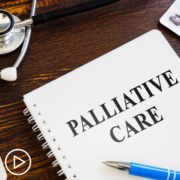Why Should People With Prostate Cancer Share Emotional Issues With Their Team?
Why Should People With Prostate Cancer Share Emotional Issues With Their Team? from Patient Empowerment Network on Vimeo.
Prostate cancer expert Dr. Tanya Dorff explains common emotional issues that arise during treatment and monitoring, and why it’s important for patients to speak up about any feelings that may be causing distress.
Related Resources:

|

|

|
Transcript:
Katherine:
Beyond treatment, another large part of thriving with prostate cancer is dealing with the emotions that come along with the diagnosis, like fear and anxiety. Whether it’s the stress of being in active surveillance or worrying about progression, many patients need help coping emotionally. Why do you feel it’s so important for patients to share these emotions with their doctor or their healthcare team?
Dr. Dorff:
I think it’s a conversation that’s not held enough between patients and their physicians, and if we don’t remember to ask our patients, we will just focus on the medical because that’s our main wheelhouse, that’s what we’re best at. So, if a patient brings forth that they’re having some emotions related to the cancer, it is helpful to us in remembering – we ought to do everything 100 percent all of the time, but let’s face it, we’re physicians with time pressures and certain areas of comfort and expertise. So, if a patient brings it up, that is super helpful because then we know someone’s needing assistance, which probably every patient is, whether they tell us or not, but that triggers us to then offer appropriate referrals.
And also, it tells us they’re open to it. If we have to ask every patient, “Are you having any emotional distress?”, even if someone answers yes and then we make a referral, they may not have actually been ready for it or open to it. So, having the patient come forth and raise that, I think, is really helpful and important.




